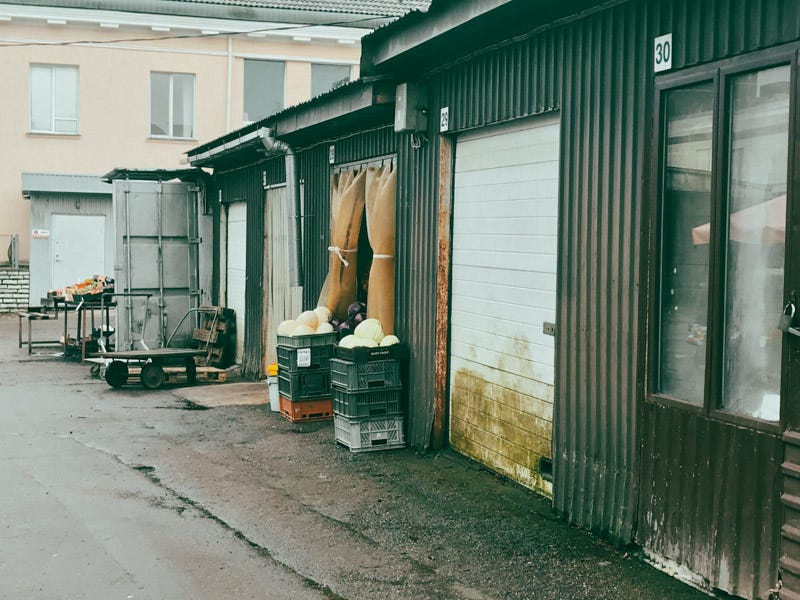Today at the Central Market, the cottage cheese lady almost smiled to see me. She’s been friendly as I’ve learned more Estonian words to place my order. But then I pointed at some tubs with Estonian labels and asked if they were “smetana”, which I knew was Russian for sour cream. The Estonian word seemed not to be as specific and included things like “vanilla flavored,” which is not something I thought it was reasonable to do to sour cream.
[Note: This is a follow on from Establishing the Value of a Russian Smile, documenting my initial interactions at Tallinn’s Central Market]
The woman shrugged at me, possibly because I said it wrong or possibly just not expecting me to suddenly burst out with Russian. The market vendors do not have much patience for questions; special orders are right out of the question. I stuck to my 250 grams of cottage cheese and moved on, wondering if I could at least manage a bag of onions somewhere. The woman at the table right outside had overcharged me twice so I needed to find someone else.
There was another area in the market, a set of corrugated tin stalls at the back of the market. Prices, where I could see them, seemed to be slightly cheaper. But these stalls were frightening because I had to actually walk inside and commit myself to interacting, just to find out what they had for sale. I had noticed one stall with five-kilo bags of onions piled up in front but did that mean we sell onions here, come and select a few! Or did it mean you can buy this bag, good luck getting it home! I had no idea.
I hate not knowing the rules.
It was threatening to snow. I needed to make a decision. “I’ll just go to the supermarket” seemed like a cop-out.
I only needed onions. I knew that it was possible to buy onions. I knew how to say onion in Estonian (sibul). How hard could it be? I saw a woman walk out of a stall with a bag of three potatoes in her hand. At least it seemed like I wouldn’t have to buy five kilos worth. I walked inside.
Open crates of vegetables were piled up on either side of me: potatoes, cabbages and yes, onions. There were also plastic tubs of honey and a big vat of bright green cucumbers floating in salty water. A wrinkled man with close-cropped white hair stood in front of an old fashioned cash register and looked at me wearily. He said something as a greeting and I apologised in response. I picked up three onions and handed them to him. He weighed them and looked at me expectantly. I paused, looking at the salted cucumbers. They looked very good but I couldn’t very well fish them out with my fingers. I was going to have to speak.
“Neli tükk gurk, palun.” Four pieces of cucumber. Close enough.
He did a double-take to hear me speak Estonian and counted them out carefully, starting in Estonian and then with a sly look at me, switching to English. “Üks. Kaks. Three. Four.” I beamed at him and he smiled back.
He put the cucumbers on the scale and then punched in numbers on his calculator and held it up to me to show €1.86. The onions should be less than a Euro, so I handed him three euros, hoping that that would be enough, especially hoping that he wasn’t going to tell me he wanted some extravagant price.
He shook his head no.
I took a deep breath.
He put a euro on the counter. Then he held up the two-euro coin for me to see. He put it into his register and picked up a few copper coins and put them next to the one euro coin.
It seemed that it was €1.86 for the cucumbers and the onions both. It was a good price but even more important, he stopped me when I was clearly happy to overpay. Unlike the woman with the horseradish, who I still glared at every time I walked past her stall, he did not think that I should have to pay more than the locals just because I was stupid.
I said “Aitäh” in Estonian (Thank you) and he said “You’re welcome,” in English and then as I picked up my change, he went through a list. “Hello. Goodbye. Thank you. You’re welcome. Please.”
He reminded me of my German great grandfather, who had learned a few useful words and phrases in English during World War I, which he would recite to me proudly. It was much the same, except that my great-grandfather’s list included “Where are the girls?”
I smiled at the market man and said, “Perfect!” Sadly, this was not a word he knew. I stuck to words that he’d already used: “Thank you! Goodbye!”
“Goodbye,” he said proudly.
As I stepped out, I looked at the hut, just another tin hut in a row of tin huts. I hoped that I might find the right one again. I felt like maybe I had made a friend.




